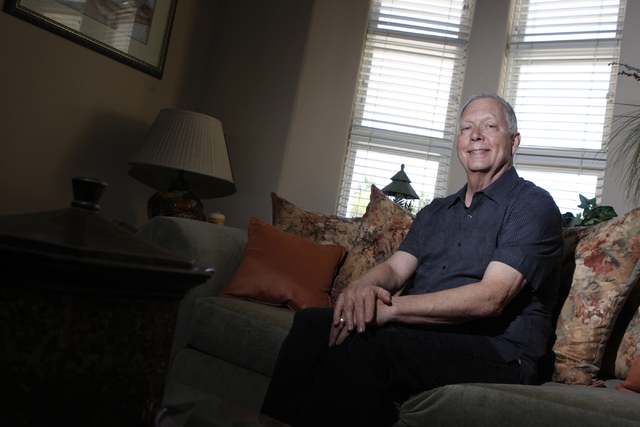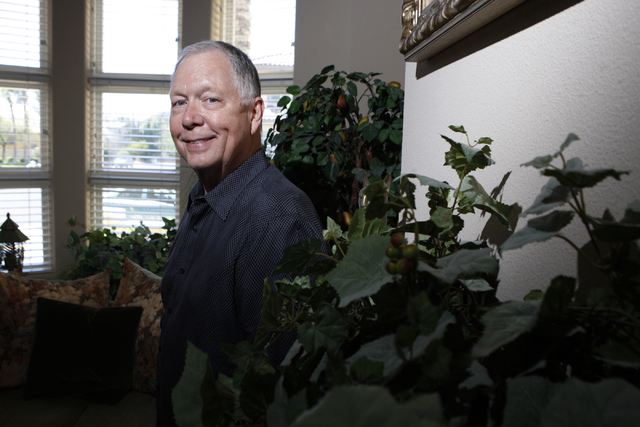Some Las Vegas HOAs cast in role of underdog
Valley homeowners associations have so many headaches these days, there may not be enough aspirin.
A lack of clarity about superpriority liens; banks’ apparent hesitance to foreclose and a law limiting what can be repaid at foreclosure are flummoxing HOAs.
Homeowners who haven’t paid HOA assessments in years are a particular bother. That trend became prevalent in Las Vegas during the Great Recession, as many homeowners stopped making both mortgage and assessment payments.
“People think homeowners associations have deep pockets,” said Greg Toussaint, president of The Lakes Association off West Sahara Avenue. “Well, the HOA’s pockets are only as deep as their homeowners’ pockets.”
HOAs function as not-for-profits by law, said accountant Michael Sharon, board president at Hidden Canyon Estates in Centennial Hills. He’s served for nearly 10 years at Copperfield, at the southwest corner of the 215 Beltway and Jones Boulevard, first as treasurer, then as president.
Copperfield’s monthly assessment fee in the ’90s started at $32 and has risen to $36 after two fee increases, he said.
“We’ve kept the fees as low as possible,” he noted. But, “during the downturn, we lost about 20 percent of our income.”
Toussaint said delinquent fees didn’t become an issue at his HOA until 2007 or 2008. The problem, he said, is that HOAs budget their dues to match expenditures.
If expenditures rise, assessments must rise. If expenditures drop, so can assessments.
Those expenditures cover maintenance tasks — such as landscaping, gate fixing and graffiti removal — and can sometimes cover the costs of hiring management companies.
Copperfield’s yearly costs run about $65,000, Sharon said. That includes a yearly $850 landscaping contract, and the monthly $150 expense of controlling graffiti.
When homeowners don’t pay, HOAs may make up the difference by charging those who already do.
For his 300-home community, which includes a small shopping center, Toussaint estimated HOA losses close to $100,000 over the past six years. He estimated annual expenses of $700,000 to $800,000. His HOA raised assessments at least three years in a row since 2007, he said.
SOME HOAS CASH-STARVED
The average percentage of Las Vegas homeowners who have missed payments is running at about 10 percent to 15 percent, attorney Paul Terry Jr. said.
Terry is managing partner of law firm Angius &Terry LLP, is the former president of the Nevada chapter of Community Associations Institute, a national resource organization for volunteer HOA boards and community management companies, and is managing member of ATC Assessment Collection Group LLC, which provides collection and foreclosure services to Nevada HOAs.
Although some lost revenue returns to HOAs when homes are short-sold or foreclosed, the time it takes can be a problem, particularly with banks hesitant to foreclose on many Las Vegas homes.
This hesitance has left some HOAs cash-starved, Toussaint suggested.
“A lot of HOAs are losing money, not from an income/expense point of view,” he said. “They’re losing money because there’s no money in the bank.”
Assembly Bill 204 in 2009 changed the cap on what HOAs could collect at foreclosure from six to nine months’ worth of fees, except when federal regulations adopted by the Federal Home Loan Mortgage Corp. and the Federal National Mortgage Association required a shorter time.
But even when the HOA gets its limited due after years of delinquency, there’s the question of whether that money should also cover costs accrued when collection companies take over.
That’s where superpriority liens are stirring a firestorm. Some attorneys believe a clarification issued in another matter hints the Nevada Supreme Court will rule to exclude collection costs. But the court has yet to rule.
Nevada law favors HOAs with a superpriority lien, enabling them to file liens against homeowners who haven’t paid. The law entitles HOAs to take back their nine months’ dues when the bank takes back the unit or sells.
But an issue in litigation is exactly what the superpriority should include, for example, collection fees.
“If you have to pay the cost of collections, then you start wondering whether going through the collections process is a good business decision,” Toussaint said. “What are other people going to do once they realize that HOAs aren’t going to spend money trying to collect because it’s a bad investment?”
During collections, HOAs hold the threat of themselves foreclosing, over the heads of owners. In a decision released Thursday, the state Supreme Court ruled that foreclosure of the superpriority lien effectively wipes out the first mortgage.
Terry said investors have been buying properties at those foreclosure sales, then suing banks, getting court orders that wipe out the banks’ liens. In turn, banks sue HOAs and collection companies, seeking to establish that someone else did something wrong, so banks don’t lose their equity.
“A lot of associations are now afraid to foreclose,” he added. “And understandably so.”
SOME IN BETTER SHAPE
Not all HOAs are in the doldrums. Judith Hanson, vice president of Aliante Master Association, a vice president on Sun City Aliante Community Association’s board since 2008, and treasurer at Fields at Aliante Homeowners Association, said that Aliante Master was able to declare a payment holiday for two months in 2013.
Negotiated contracts with larger vendors and a successful water conservation plan contributed to the community’s good fortune.
Aliante Master, nonetheless, decided to get more aggressive with homeowners who hadn’t paid in 2013.
“You have a homeowner that has built up $2,000 worth of assessments,” she said. How many years has he been in that home that he has not paid? That was what we went after.”
Delinquent or formerly delinquent Las Vegas homeowners contacted for this story failed to return phone calls or declined to comment.
Changing the nine-month cap doesn’t seem to be on the Nevada Legislature’s 2015 agenda. However, state Sen. Aaron Ford, D-Las Vegas, has put in a bill draft request to address the Supreme Court opinions on superpriority liens.
For Toussaint, the issues come down to making neighborhoods look good.
“We want homes to be occupied,” he said. “We want homes to look good. We want homes to be paying their assessments.”




















